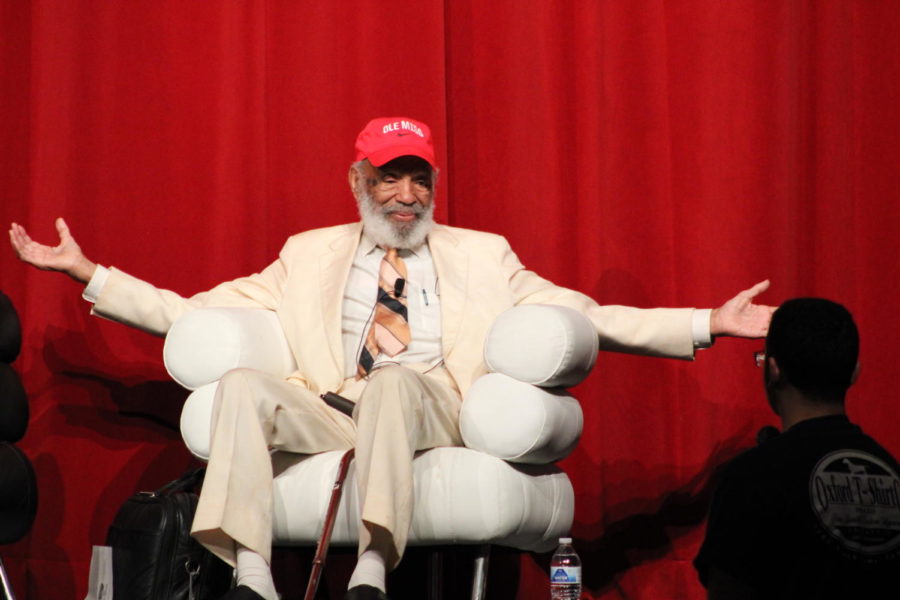Civil rights trailblazer James Meredith visits with OHS students
February 16, 2023
James Meredith, American Civil Rights activist and trailblazer, was the first Black student to enroll at the racially segregated University of Mississippi in 1962. Over 30,000 members of the National Guard were on the school campus to help ensure a safe environment for Meredith. Sixty-one years after the integration, Meredith took the stage in the fine arts auditorium at Oxford High School to address the students. Meredith was joined onstage by the Eastland family as a symbol of long-standing friendship after years of racial reconciliation between Meredith and the family.
When reflecting on his encounter with the integration process, Meredith corrected what he saw as several widespread misunderstandings.
“The only thing ever written about the national guard is that it was federalized,” Meredith said. “There were 20,000 of them and 10,000 regular troops. These soldiers came in and put down the insurrection. They called it a riot- that was never a riot. A government can’t riot, and this was led by the government. A government can’t riot. There was an insurrection in Mississippi and the president of the United States at midnight signed an order so that the troops could come in here. Otherwise, they couldn’t come in here.”
Meredith’s commencement ceremony upon graduating from the University of Mississippi in 1966 was not the end of his journey, but rather the beginning. He was determined to leverage his experiences as an Ole Miss undergraduate to continue his fight for equal rights.
As both an activist and community member, Meredith organized the March Against Fear from Memphis, TN to Jackson, MS, in 1966 to call attention to voter discrimination and racism in the South. Meredith reflects on this fear as something that we are still facing today.
“I consider this march absolutely the most important thing that I ever attempted,” Meredith said. “Fear is the biggest factor for all of black and white racial problems and we need to start dealing with it in a realistic way.”
Defeating fear provided Meredith with rare confidence. Even the prospect of death was a minor hurdle to his progressive ambitions.
“No one was more surprised than James Meredith, when I drove from Oxford to Memphis where the federals dropped me off and I was still living,” Meredith said. “I made one offer. Either give me what I have coming, an education in Mississippi, or kill me. No one was more surprised that I hadn’t been killed than me. I was still living, and that’s the only thing that mattered.”
According to Meredith, a relatively unknown yet consequential period in his life was his time deployed in Japan as a member of the U.S. Air Force before enrolling in the University of Mississippi. These years were some of the most formative in his early life, as he explained to the rapt student audience.
“The most significant part of my life was the nine years that I spent in the military before I came with the plan to break the system of white supremacy,” Meredith said. “I was in the very first group of military people that allowed blacks and whites to take boot training (basic training) where you learn how to march and obey orders and get into good physical condition. I was the first black ever assigned to any outfit I was in for nine years, including the last three years which was our session in Japan. That was the most valuable period of time of all because when I went to Japan in 1957 the war had been over 12 years, but the segregation practice had only started six months before I got there.”.
Meredith recalled that even halfway around the world from the U.S. government orchestrated segregation still occurred.
“America set up segregation in Japan,” Meredith said. “Only whites could go out the front gates just like the most small towns in Mississippi when blacks would be on one side of the railroad track and whites would be on the other. Blacks had to go out the back gate or west gate,” Meredith said. “There were Japanese who operated at the front gate, and outside of the front gate were the white clubs and entertainment places. Most bases had just 4-500 troops. At this place when you had 10,000 more blacks at that gate than you ever had in Oxford so it was important that blacks had to go out the back gate.”
Three generations of the Eastland family were represented on stage during the event. Both Hiram C. Eastland, Jr., the nephew of James O. Eastland, who was a Mississippi senator during the time Meredith attended the University of Mississippi, spoke on behalf of his family regarding their long relationship with Meredith.
“The first time I ever heard of James Meredith was when I was 12 years old. Senator Eastland, my uncle, lived right across the street,” Eastland said. “During the Meredith Crisis we were back and forth across the street all week long. The senator was helping the President, John F. Kennedy, and Attorney General Robert Kennedy get James to Ole Miss without him getting hurt, and the first time I ever met him he told me that.”
Eastland distinctly remembered answering the phone and being surprised by the caller on the other end.
“It ended up being President John F. Kennedy who said he wanted to speak to his friend Jim,” Eastland said. “This was the first time I had ever heard of James and who would’ve thought it would come full circle to us being the best family friends.”
History teacher John Mistilis served as the mediator for the event. Guided questions from Mistilis helped remind students how the fight for racial equality is still not over.
“I think it’s obvious. I think it’s a living, breathing topic,” Mistilis said. “I think civil rights that we call it is more in tune to human rights. We could keep it local, we could make it national, we could make it international but I think human rights as we move forward as a society is something that we will always be trying to better.”
Mistilis believes that “snapshots” of history like the one presented by Meredith allow people to reflect and learn how far humanity still has to go.
“He (Meredith) presented the visceral, real, societal environment that we live in and I think that’s what we need to be talking about,” Mistilis said. “It takes dialogue, it doesn’t take hysterics and that’s what I think his message was.”
OHS principal Dr. Dana Bullard expressed her gratitude for the numerous lessons that Meredith left behind, especially for high school students.
“I’m glad that our students were able to see him. You can tell he is still a warrior, he’s still seeing injustice,” Bullard said. “It’s one thing to say he’s in his 90s now, this stuff happened in the 60s but the fact that he still sees injustice and is courageous enough to say it aloud and know that we have to deal with it but still wants us to be working together is amazing to me and I hope the kids took that away.”
Bullard hopes students will reflect on what they heard and learn meaningful lessons from it.
“Sometimes we look at history and we think that’s past, but the Tyree Nichols shooting just happened weeks ago,” Bullard said. “This man (Meredith) has seen so much and is still involved. It would be simple for him to say, ‘I did what I did for integrating America, and y’all take care of the rest’, but for him to still talk to the truth about what’s going on is amazing and I hope our students saw that.”




